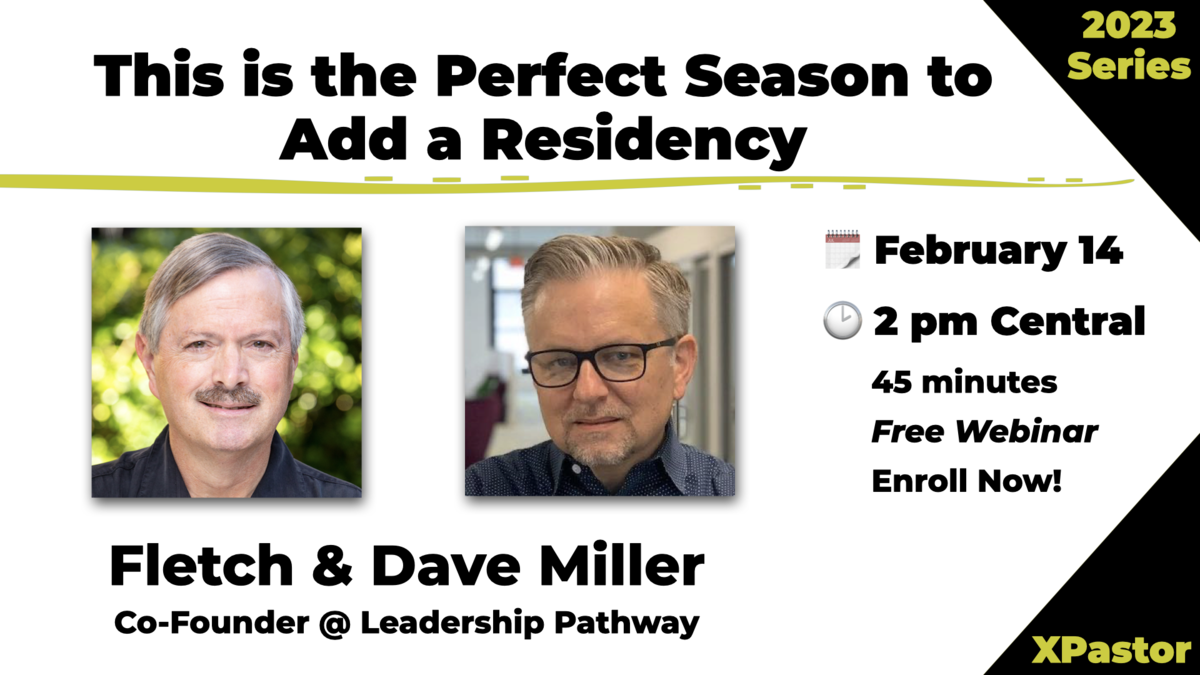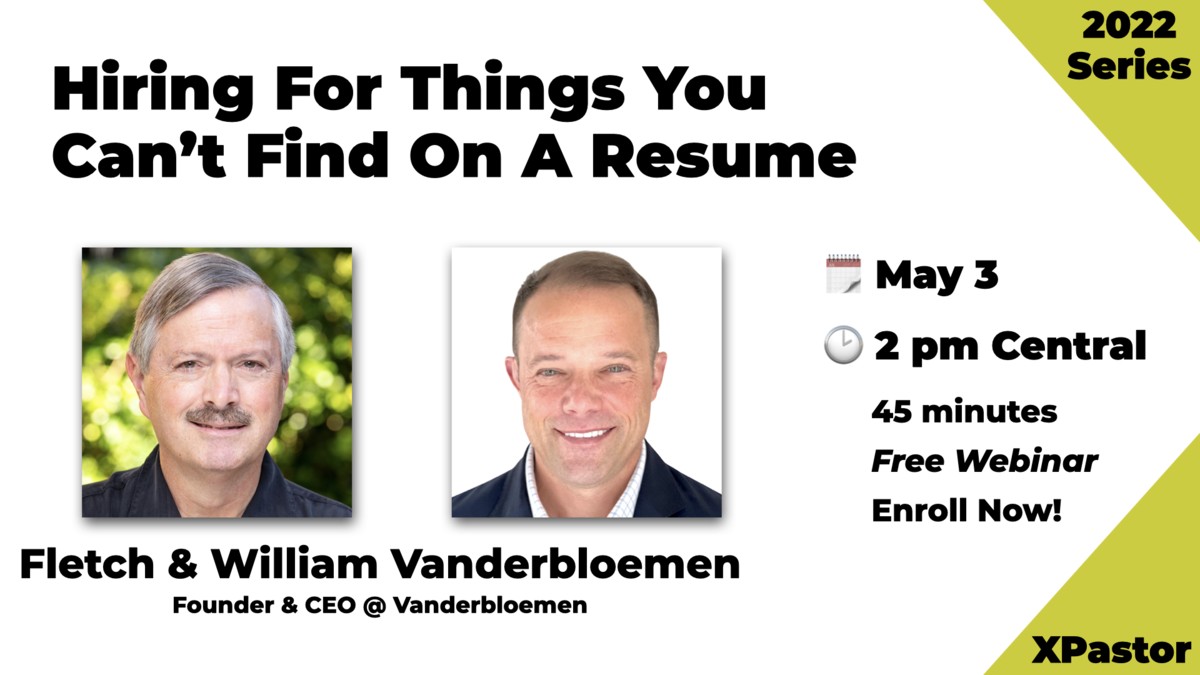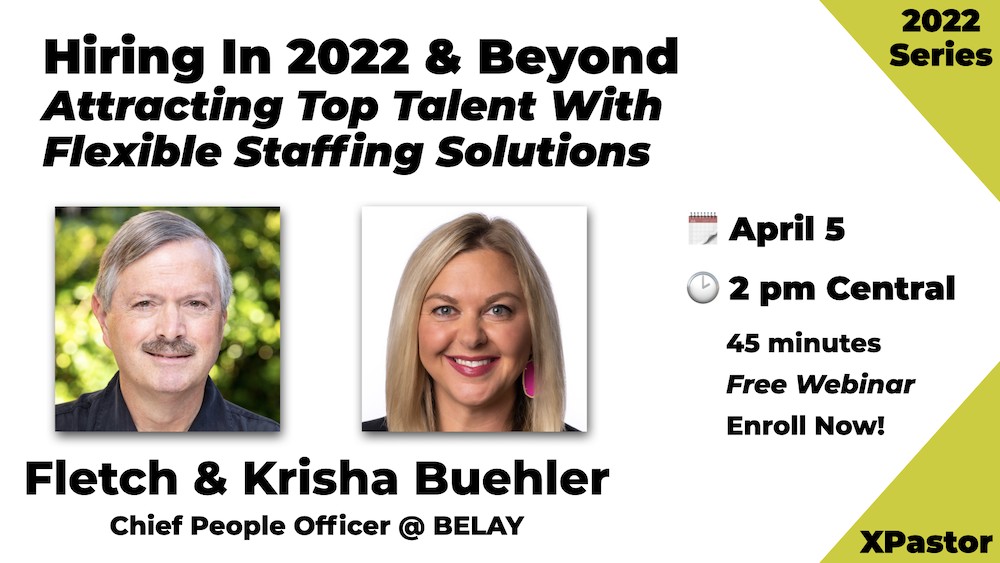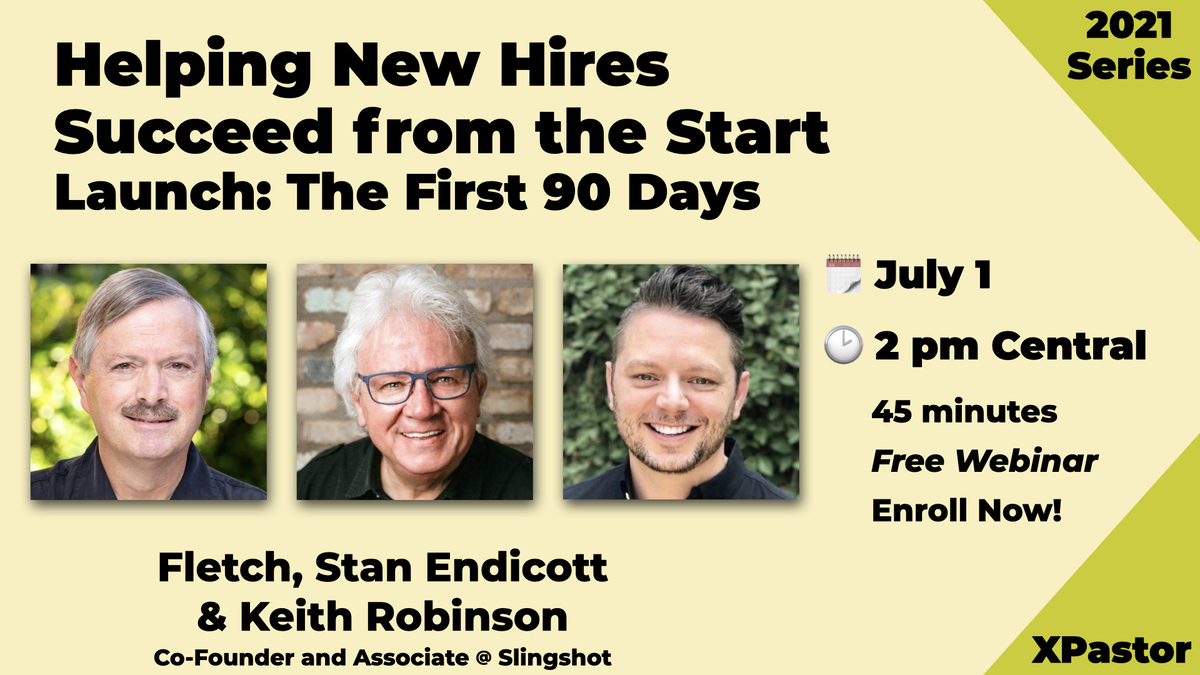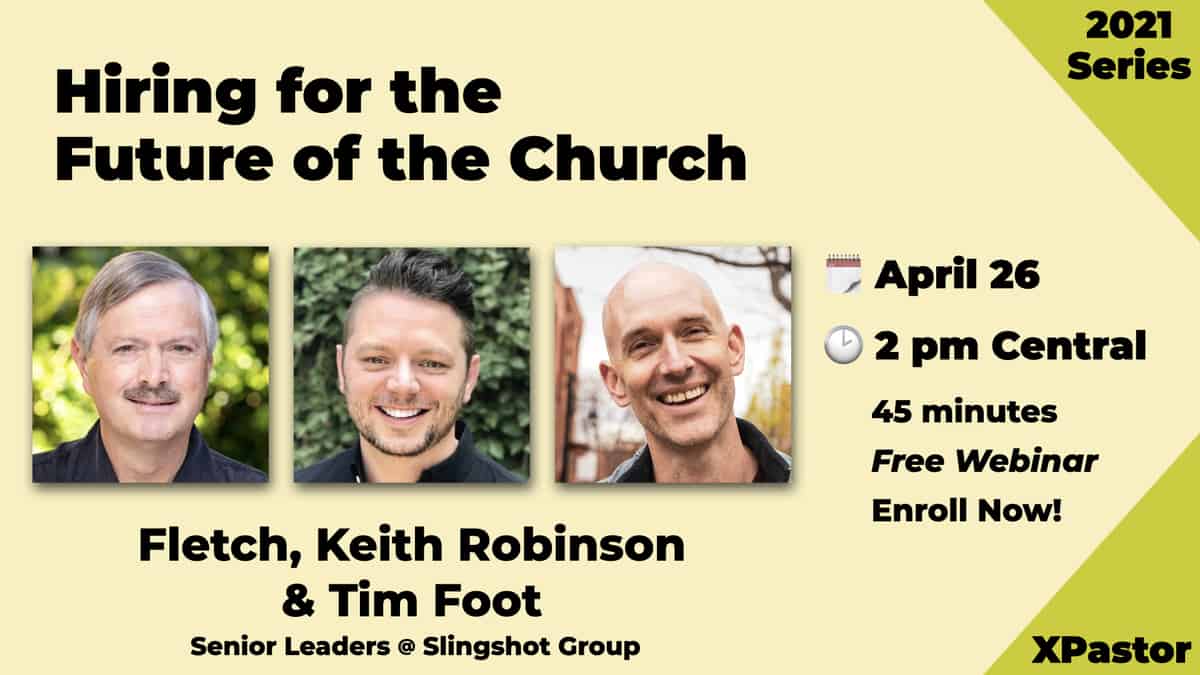Hiring. Just saying the word out loud for many pastors produces audible groans, pained expressions and rolling eyes. Hiring. Everyone knows it’s a necessity; hardly anyone sees it as glamorous. Yet a few, perhaps, see in it and through it a great opportunity to maintain or even increase spiritual momentum; an opportunity to positively influence their church’s future trajectory; to go from good to better or even from good to great.
In a 2006 Leadership article, famed business guru, Jim Collins, author of Built to Last and Good to Great, discusses how his work transfers and applies to the non-profit sector. In that article, he offers these informed and insightful observations on hiring:
Collins: Great institutions discipline themselves to get people whose character is naturally to exhibit great behavior.
Leadership: Since discipline is so key, where do you most often see breakdowns in discipline?
Collins: Not being rigorous about who’s put in leadership roles. In churches and other social sector organizations, the work is too important to let key seats on the bus be occupied by the wrong people.
He elaborates on this same theme a little later:
Leadership: How does a church begin moving toward greatness?
Collins: By getting the right people in key seats. These right people then ask, ‘What are the brutal facts we must confront?’ Notice what I did not say. They do not begin with a vision to rally people around. They say, ‘Let’s get some strong people in key seats who care about the cause we’re engaged in. Even though we don’t know the strategy or the end vision, there is an allegiance to the mission. Then they confront, “Why aren’t we great? What do we need to do to move the flywheel toward a higher level of performance?”
Disciplined hiring. Apart from the sovereign work of the Holy Spirit of God, hiring is—perhaps—one of the most important issues any church can tackle, but unfortunately often one of the most neglected. The question is simply this, “If you have the privilege and responsibility for hiring at your church, how do you hire the right staff?” How do the “great” ones do it?
Fellowship Bible Church in Little Rock, Arkansas has learned a thing or two about hiring over its 30-year ministry history. As we will see in the next section, successfully implementing their broad spiritual vision has extended beyond the reach and/or control of what its Senior Pastor alone could do. They have had to find the right staff time and time again to maintain and even increase their spiritual momentum. They grasped some time ago the truth that realizing your preferred future depends on recruiting the right staff, on being disciplined about hiring.
Fellowship Bible Church, Little Rock
In the opinion of many familiar with its ministry, Fellowship Bible Church of Little Rock (FBCLR) is a “great” church. But biased opinions aside, as we will see, FBCLR also meets Jim Collins’ criteria for “greatness” in the non-profit sector …
Greatness does not equal bigness. Big is not great and great is not big. In fact, the bigger you become the harder it may be to remain great. For my purposes, an organization must have three things to qualify as great:
- Superior performance relative to its mission in the world.
- A distinctive impact on its community. So you’d say, ‘If this church disappeared, it would leave a serious hole in this community.’
- Making an impact over a long enough time, so that it’s not dependent on the personality of one leader. If a church is effective during one pastorate, it may be a church with a stellar pastor, but it is not yet a great church.
But Fellowship Bible Church of Little Rock did not begin as a so-called “great church.” In fact, it had very humble beginnings as its website succinctly communicates:
It was the 1960’s at the University of Arkansas when God hooked up a small group of students—Robert Lewis, Bill Wellons, Dennis Rainey, Barbara Peterson, Debbie Brasher, Mike Boschetti, John Rees, Starr Chenault, Carolyn Williams, Bill Carter, Sally Fontaine, Caroline Meyer, Shirley Price, Susie Wilson—none of whom had given much thought to God or His plan for their lives.
By 1977, 18 individuals began meeting in each other’s homes to discuss Don Meredith’s vision of starting a new kind of church. Using Fellowship Bible Church in the Dallas area as a model, and the worship and teaching styles they’d experienced at University Baptist in Fayetteville, Fellowship Bible Church of Little Rock opened its doors on August 21, 1977. Fifty-nine people attended its first service, which was led by Dennis Rainey at the Anthony School.
Attendance increased so much in its first ten years that the church had to move three times, first to Pulaski Academy (1980), then to Breckenridge Theatre (1983), and finally to what is now the Special Events Center (1985).
Yet the church’s second core value—Growth—has nothing to do with church size, but everything to do with its members’ love relationship with Jesus Christ.
Yet from these humble beginnings its mission, stated today as “Reach—Build—Release,” merged and forever changed the fellowship. Again, its website states:
A defining moment for this kind of growth (developing a deepening love relationship with Jesus Christ) hit in the fall of 1983 during the first State-of-the-Church address when Robert Lewis (FBCLR directional leader from 1980-2003) unveiled a new definition for Fellowship, calling it an equipping church. ‘Without practically-attractive, spiritually-compelling, proof-positive lifestyles, what good are our claims and pronouncements about a life-changing God?’ wrote Lewis. ‘If we can’t outlive the world at every point—in our marriages, with our children, at work, with money, in our relationships, in the use of our time—why dare to speak of salvation and the abundant life?’
As the Holy Spirit radically transformed the lives of members, more people were drawn to Fellowship. In fact, just three years after the church’s first worship center was completed, FBC moved to three Sunday services (1988), then to a larger temporary worship center (1995), then to the current worship center (1996), back to three services once again (2001), and finally returning in 2003 to two services—but with the exciting new twist of multiple worship venues supported by advanced video technology.
But, as the website continues, “the church’s most revolutionary moment was yet to come.”
In late 1996, at a staff leadership retreat, the question was posed: ‘Is our community really being changed?’ In the discussion that followed, someone read Jesus’ words in Matthew 5:16, ‘Let your light shine before men, that they may see your good deeds and praise your Father in heaven.’ This big idea of ‘irresistible influence’—now known simply as ‘i2′ was introduced during the 1997 State-of- the-Church address, and its impact has been astonishing not just in Little Rock, but around the world. In its first year, over 400 people were trained to share the gospel through One-to-One. Men’s Fraternity grew to a citywide outreach (1998). ShareFest began (1999) with support from over 100 area churches who were willing to cross denominational and cultural lines and give back to the community as one voice for Jesus Christ. Other communities have followed Little Rock’s lead, hosting their own versions of ShareFest in areas such as Texarkana (Arkansas/Texas), Tuscaloosa (Alabama), and Phoenix (Arizona).
At the present time (2007), Fellowship Bible Church of Little Rock has its own association of churches called Fellowship Associates (1999); it has exposed over 1,000 church pastors and lay leaders to the concept and implementation of becoming more i2 in their communities through the “Church of Irresistible Influence conference” (2001); and has extended its outreach into other communities through two church plants.
As this brief history reveals, FBCLR has unquestionably demonstrated superior performance internally by “Reaching” or growing the size of the church and by “Building” or facilitating both the expectation and experience of spiritual life change within its congregation. With ShareFest and other similar programs, they have left an indelible mark on their community such that if they withdrew from their community there would be a gaping hole. Not only that, but they are moving from good to better with the advent of Tim Lundy assuming the directional leadership from Robert Lewis in 2003. Whether by biased opinion or by Jim Collins’ three “greatness” criteria listed above, Fellowship Bible Church continues to move from good to great.
And if what Collins asserts that “the bigger you become the harder it may be to remain great” is true, then hiring for Fellowship will remain a strategic core competency at the executive level for maintaining and increasing its spiritual momentum.
The Hiring Process
Seeing what we’ve seen from Fellowship so far, we might rightly expect their hiring process to be prayerful, robust, disciplined and rigorous. This is indeed the case. Ken Dean, Fellowship’s Executive Pastor, says, “(by now) it’s probably (become) a part of our DNA to be thorough and try to evaluate … (a candidate’s) life, work and spiritual experiences. A copy of the full hiring process is contained in Fellowship’s “Hiring Process Documents” found in Appendix 1 (all Appendices can be viewed in the PDF below the article). With such a detailed process, it would be easy to become overwhelmed. So in this paper we will “fly over” the entire process stopping briefly to examine the major building blocks one at a time. We will go a little more in-depth, however, on two parts identified as “key” by Dean. For our purposes, we will also try to limit our hiring focus on pastoral-type staff, though much of the process described below could apply to administrative staff as well, as described in Appendix 1, pages 6-7. Overall, Dean estimated that for a pastoral or executive level hire, some 50-80 manhours are invested in their process from start to finish, while for more entry-level positions, 15-20 hours might be normal.
Preparation and Approval
The first step in Fellowship’s hiring process is an internal one called “Preparation and Approval.” This phase of the process establishes the true need for an additional staff member, based on objective criteria and research rather than simply on a staff member’s “felt need.” Page 3 of Appendix 1 shows a sample of the “Hiring Request” form.
Once the research has been completed, the new position justified, approval has been received from the appropriate supervisor and funding has been reviewed by the Finance Department, a “Position Focus Sheet” or “PFS” (pp. 4-5 of Appendix 1) is created by the candidate’s direct supervisor, though input may also be received from others on an as-needed basis. If the hire is to replace a former staff member, the justification step is bypassed and the former, but existing PFS is modified as needed and then approved. This preliminary or top-level PFS is then sent to the Human Resources department to be bundled with a standard interview packet. At the present time, Fellowship has a Human Resources department staffed with one full-time and one half-time employee to process, among other things, these hiring applications.
According to Dean, there are two big keys to hiring the right person. The first of these big keys is preparing a well-done Position Focus Sheet. The final Position Focus Sheet for the Executive Pastor is shown in Appendix 3. Dean believes a well-done PFS should clearly and simply communicate the key roles, relationships, values and priorities required by the position as indicated in the example. He feels anything longer than two pages might be too long for many temperament types, so he stresses a goal of one page—and if it goes to another half page, that is acceptable. Dean would undoubtedly agree with the KISS principle—keep it short and sweet—and also want us to use plain, everyday language in order to best communicate with those not familiar with our ministry language or internal “buzz” words.
He also expresses concern over a PFS prepared by a committee, “Your typical recruiting tool (as opposed to our PFS) is developed by a committee. Everything starts with a jump ball. There isn’t a filter for anything that doesn’t need to be in there, so it’s just a collection of everything and the kitchen sink.” He adamantly believes the direct supervisor should take the lead and be responsible for determining and defining the PFS, not Human Resources. He also notes that the purpose behind putting the hours next to key tasks on the PFS is to help the candidate understand where his time priorities should lie, again striving clearly to communicate as many expectations as possible up front.
The completed PFS also likely undergoes some level of revision before it receives final approval from the hiring person’s direct supervisor. Once the Hiring Request and the PFS have been completed and approved, the process is ready to move on to step two. This is such an important step at Fellowship that the hiring process cannot commence without an approved PFS and Hiring Request.
Recruitment and Interview
Steps 2 and 3 of the hiring process involve identifying, evaluating and interviewing potential candidates. Appendix 2 contains the cover letter Fellowship sends to its prospective candidates. The letter is not only designed to make contact but to unambiguously educate the candidate on each successive step of the process, especially managing the candidate’s expectations with the phrase by “mutual agreement.” For Fellowship, the hiring process is a two-way street. The step identified as “Preliminary” is usually completed over the telephone and the internet while the steps labeled “Prospect” and “Pursuit” require a greater level of investment of time and money as the candidate must visit the Fellowship Campus at least once, and, depending on the level of the position in question, multiple times.
As in other large organizations, the Human Resources department at Fellowship usually conducts the initial or cursory interview over the telephone for all candidates. This initial screening looks to remove candidates from the list who do not possess the required education and/or experience needed to move along any further in the hiring process. For example, if a pastoral position required a Master of Theology or equivalent seminary degree and a man did not possess that degree, Human Resources would remove that man’s name from the list of “qualified” candidates. Dean did not hazard an estimate as to what percentage of the candidates are trimmed at this stage, but thought it was probably large.
Dean commented that Fellowship recruits for pastoral-level positions both from within the congregation as well as from without it, each in its “season.” They do not subscribe to the “hire internally or don’t hire at all” philosophy. Rather it would seem they follow the adage, “form follows function.” They intend to hire for specific roles and/or tasks and that is what drives the avenues down which they search. They want the best person for each position recognizing that sometimes that person is within their walls, and sometimes is not. They also tap into seminaries and other churches within and outside of their association as well as using personal and professional networking to find qualified candidates. As of this writing, however, there is no formal, church application that a prospective candidate must fill out that might provide personal information and grant the permissions required allowing Human Resources to perform a preliminary screen based on illegal activity and/or child sexual abuse.
As we have seen, the first big key for Dean is completing a well-done PFS, or job description. This is the check-and-balance that seeks to preserve the church’s desired trajectory and spiritual momentum. The second big key in successful hiring is focusing on the right person. Despite how it initially sounds, this is not just stating the obvious for Dean. By this he is using a short-hand way of describing an intentional, orchestrated, spiritual discovery process where details about the candidate’s character, his competence or experience in ministry and his chemistry with the staff and the mission and vision of the church are “mined” from their interviews and instruments. Like many churches, Fellowship strives to probe for information from a potential candidate in the three big areas of Character, Competence and Chemistry or “fit.”
Character
With respect to discovering a candidate’s Christian character, the process is straightforward and uses personal interviews. Following a brief faith testimony from him, the “Candidate Questions” (see Appendix 4) would be covered most likely over the telephone. Any issues or problem areas the interviewer hears or discerns are followed up on using additional questions to gain increased clarity. Particularly troubling and destructive issues in today’s society, such as alcohol, drugs, anger management, internet pornography and moral failures are also addressed in an up-front way during this interview. Dean says all references are checked at this stage, and, depending on the position, the spouse may be interviewed as well. He also realistically noted that even though they are as conscientious and careful as possible, those who desire to intentionally hide or deceive Fellowship are obviously able to do so. No screening or discovery process can eliminate all errors or future staff problems. But without “passing” the character component, the foundation upon which all else is built, no potential candidate will proceed further in the discovery process.
Competence
To discover a candidate’s competence, particular attention would be paid to his resume. Because past performance is still the best indicator of future performance, the interviewer, many times the direct supervisor, would look for a track record of doing what Fellowship needs done in its open position. Some key references may be followed up here if needed to better understand the accomplishments listed on the resume. The previous telephone interview concerning our candidate’s character would naturally and logically flow into a dialog about his ministry history and performance—again with the attitude of discovering what this man has been like and how he has performed in his previous ministry positions, including any more minor things that may have been left off the resume. When and if the time comes for a face-to-face interview, our candidate would be asked to provide additional details on the parts of his education and experiences that would be of particular interest to Fellowship. At Fellowship’s size, it is clear that they hire “Specialists” for particular ministry areas, not “Generalists.”
Chemistry
The most elusive aspect of the hiring process is the discerning of a candidate’s level of organizational and missional chemistry or “fit.” This component tries to discover if the potential candidate already manifests the necessary DNA, not only to fit in with the staff but with the preferred ministry direction of Fellowship. Dean uses up to four different online instruments to discover the level of fit, acknowledging that it is always a subjective process at best. To say the same thing a different way might be to say that the ideal hiring process is one where science and art coalesce.
The fit category breaks down into two subcategories for Fellowship. The first subcategory is the “Personality Component.” To assess a candidate’s personality, or at least his perception of it, Dean would send him to DiSC (or something similar) with a pre-paid code of some variety allowing the candidate to complete the instrument online. An explanation of the DiSC theory and an overview of its main parts is contained in Appendix 5, while a brief description follows from Wikipedia…
DiSC is the four quadrant behavioral model based on the work of William Moulton Marston Ph.D. (1893-1947) to examine the behavior of individuals in their environment or within a specific situation. DiSC looks at behavioral styles and behavioral preferences.
The tests classify four aspects of personality by testing a person’s preferences in word associations (compare with Myers-Briggs Type Indicator). DiSC is an acronym for:
- Dominance—relating to control, power and assertiveness
- Influence—relating to social situations and communication
- Steadiness (submission in Marston’s time)—relating to patience, persistence, and thoughtfulness
- Conscientiousness (or caution, compliance in Marston’s time)—relating to structure and organization
These four dimensions can be grouped in a grid with D and I sharing the top row and representing extroverted aspects of the personality, and S and C below representing introverted aspects. D and C then share the left column and represent task-focused aspects, and I and S share the right column and represent social aspects. In this matrix, the horizontal dimension represents a factor of “Assertive” or “Passive,” while the vertical represents “Open” “Guarded.”
Certainly paper versions of the DiSC test could be substituted for the online test if needed. The results of the online assessment are then emailed to the candidate’s direct supervisor and anyone else who might need to review it. Dean indicated that Fellowship uses the DiSC instrument primarily to gain insight into how their candidate normally and naturally engages in interpersonal relationships.
Dean also mentioned how important and helpful he has found two other online instruments to be in his or his staff’s “fit” discovery process, both being found at this link. The first test is a gauge of a candidate’s resiliency or how “thick skinned” he might be. The second is one on anger management. He believes that used together—the DiSC and the other two instruments from the “PsychTests” website—these instruments give him some level of insight into his candidate, as well as creates ideas for follow-up interview questions. He truly believes in the value of these types of instruments. He says, “I can’t tell you how often I’ve seen someone who’s really a sharp, bright person, but they’ve always got these emotional things going on.” As in all church ministry, Fellowship’s ideal candidate must be able to handle the pressure of a public position; they must be resilient; they must relate well to others, have a thick skin and know how to manage their anger in many types of public and private situations.
Besides the Personality Component, Dean also shared how Fellowship tries to discover a candidate’s “Natural Wiring” as the second subcategory of fit. From his description, it seems Fellowship tries to tease out and articulate a candidate’s unlearned abilities. Dean went on to indicate that he believed these unlearned abilities cannot or do not change over time. In other words, you are what you are and you will be in the future what you have been in the past. Your past responses to situations are the most likely predictor of how you would behave in the future. Others have said it just a little bit differently, such as “you can’t be anything you want to be.” The bottom line is this: Fellowship is seeking to distinguish those who are already going in their direction from those who are not or cannot.
The first of these online instruments to assess natural wiring is StrengthsFinder. The StrengthsFinder website says about itself:
Based on a 40-year study of human strengths, Gallup created a language of the 34 most common talents and developed the Clifton StrengthsFinder assessment to help people discover and describe these talents. In 2001, the initial version of this assessment was included with the bestselling management book Now, Discover Your Strengths. The discussion quickly moved beyond the management audience of this book. The goal was to start a global conversation about what’s right with people. It appears that the world was ready to have this conversation.
Another website says this regarding the StrengthsFinder theory that helps illuminate Dean’s statements above:
There is a widespread belief that people can do anything well if they learn enough or try hard enough. Training and development programs that attempt to teach “steps,” “habits,” or “behaviors” ignore the fact that everyone’s steps, habits, and behaviors are different—and should be different if people are to use their natural talents and strengths. This remedial approach (i.e. trying to develop someone’s weaknesses) often produces disappointing results. It rarely, if ever, helps the person achieve excellence, and it wastes training and development dollars.
The second instrument is truly the one Dean says they rely on most to discover a potential candidate’s natural wiring. It is called Servants By Design and each potential candidate is issued a pre-paid password in order to log in and complete the approximately hour-long assessment. A sample “Personal Profile Report” is contained in Appendix 6.
The Servants By Design website puts it this way:
YOU are “fearfully and wonderfully made.” (Psalm 139:13-14) Just imagine how effective you would be if you could discover your one-of-a-kind design authored by God!
Wouldn’t it be awesome if every person could learn to employ their unique design in service to Him and to others?
This is what the Servants By DesignTM Inventory is all about.
By completing the Inventory, you will receive a Personal Profile Report that will explain the core strengths of your personality, your talents and abilities in detail. You will discover:
How you have been wired by God.
How you go about doing things.
The lens through which you view life.
What makes you come alive?
Dean says, “The primary language and the primary instrument we use around here is Servants By Design. We had a couple of doctors in the church who took (an existing instrument) and translated it into a spiritually-oriented language.” Dean says there is also a one and one-half day training and certification seminar to teach those who will interpret the results in what to look for and what the instrument’s evaluation means to the organization and mission of the church. “We rely on it very heavily,” he says and continues, “We don’t want to make a hire that changes the DNA (meaning the mission, vision, leadership and operation) of our church.”
When asked about using both Servants and StrengthsFinder, Dean said for him that Servants By Design predicts as much as it describes and articulates the “language” another uses to describe himself and his ministry. Dean indicated that Servants can help him get inside the head a little bit of a candidate to probe a little deeper into how he interprets the world as well as how he sees ministry. And this is also where and how StrengthsFinder plays a role. It articulates 34 “unlearned” abilities that a candidate may or may not have, but, more importantly, provides a common “language” to describe passions and natural abilities. One suspects Fellowship, with its more diverse hiring practices, has found the need to create a common language—not only internally but with its candidates—to minimize confusion and maximize objectivity during the discovery process.
Yet science still gives way to art and intuition at a certain point in the hiring process. “I’m (still) trying to figure out a way to put words to this thing that when you’re with somebody and there’s such a kindred spirit about a broad range of topics that even though you’re coming at it from different experiences, different bents and so on, you trust each other’s judgments in those (many) areas,” says Dean. However, doing the “due diligence” using interviews and instruments—the science—helps keep Fellowship from shooting from the intuitive hip and hiring a candidate on impulse rather than by working their process.
At this point, some might feel that Fellowship’s process is too mechanical, rote, too scientific and computerized and perhaps leaves out the “art” or the Holy Spirit. What is the spiritual, intuitive side then of the hiring process? Dean addressed this issue by saying that he firmly believes that all people are uniquely created by God and that their hiring process should probably better be called a “spiritual discovery process” where they use the instruments available to discover and measure, at least qualitatively, a candidate’s unique, God-given design. He indicated they coupled the science with the art of prayerful dependence on God before, during and after each interview, whether it was in person or over the telephone. As they move down the process and personal meetings become increasingly important, Dean also said the interviewer or small group of interviewers will lay hands on particular candidates—those who will continue as well as those who will not—and pray for God’s blessing on them and their ability to use their unique design in future Kingdom work. Dean noted that all the scientific data gives you is data. It gives you starting places, open doors, and the like for discovering who God has made this person to be and what he brings to the Kingdom table.
As we have seen, Fellowship Bible Church of Little Rock has a sense of spiritual trajectory and momentum that propels it toward its future. Their primary goal is to hire other staff who will, as Dean says, “(make decisions) consistent with the history, the belief systems and the objectives of the organization and where it needs to go in the future.” A disciplined hiring process for Fellowship, in a very real sense, guards and preserves the future integrity of the ministry.
Recommendation and the Offer/Hire
Steps 4 and 5 conclude the hiring process for Fellowship. Once the instruments and interviews have been completed and the results have been evaluated, usually by a team, the primary candidate is contacted by their direct supervisor and brought to the campus again for a final, formal interview to discuss the agreed upon PFS, salary and benefits. At Fellowship there is no minimum number of candidates that need to be brought to the final dance. Dean said they always expect God to bring them the right person. If a potential candidate did not make it through to the final cut, he would be sent a letter informing him that the church did not feel the sense of fit it needed in order to bring him on staff at the present time. A good sample rejection letter from another church is included for completeness purposes in Appendix 7. If the candidate accepts the offered position, a start date is established, Human Resources is notified to coordinate the orientation process and Finance has delivered to it a Compensation and Benefit Fact Sheet to initiate compensation. As a final step, the completed interview packet, the PFS, the signed approval sheets, etc. are all compiled and put into the candidate’s personnel file.
Conclusion
Fellowship Bible Church of Little Rock has and continues to demonstrate true ministry “greatness.” They have a collective sense of ministry trajectory toward their preferred future of impacting the lives of those in their congregation, as well as impacting their local community. They also have a wonderful sense of spiritual momentum that has and continues to carry them along that path. We do not doubt that they will continue to “reach, build and release” another generation of Christ-followers who will themselves leave spiritual legacies.
They are also a church that takes hiring very seriously. There is no haphazardness or impulsiveness about its importance or its execution. They have a well-defined and written process which they work with discipline and rigor. They know what they want. They put in the required time to do it well. They do not circumvent it or short-circuit it because they know that it is through that process that they will discover or discern potential new staff members who are already going in their direction and then invite them aboard for the ride. As Jim Collins might observe, Fellowship seems to see hiring in its true light—the strategic process that ensures the future health, well-being and “greatness” of a local church.
View the Footnotes and Appendices in the PDF: Hiring: How the Great Ones Do It




